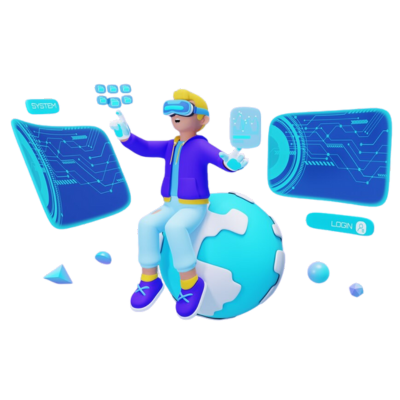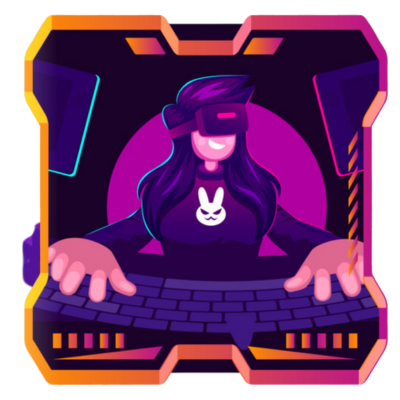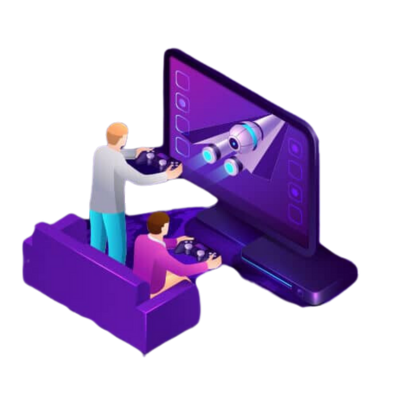Introduction
The gaming industry is on the brink of a new era, one that is being shaped by the convergence of Web3 technology and the concept of the metaverse. Web3 games, which leverage blockchain technology, decentralized platforms, and non-fungible tokens (NFTs), are not only transforming how games are played and monetized but also laying the groundwork for the metaverse—a fully immersive, interconnected virtual universe where users can interact, create, and transact in real-time. This blog will explore how Web3 games are influencing the development of the metaverse, discuss the technical aspects of this evolution, and highlight the role of Web3 gaming companies in driving this transformation.
Web3 Game Development Company
Work with a leading Web3 game development company to create the future of gaming.

Understanding Web3 Games and the Metaverse
What Are Web3 Games?
Web3 games represent a new generation of online gaming that operates on decentralised networks using blockchain technology. Unlike traditional games, where the game developer or publisher controls all aspects of the game, Web3 games give players ownership of in-game assets, governance rights, and the ability to interact with a decentralised economy. These assets, often represented as NFTs, are unique, transferable, and stored on the blockchain, ensuring transparency, security, and true ownership.
Defining the Metaverse
The metaverse is a collective virtual shared space that is created by the convergence of virtually enhanced physical reality and physically persistent virtual reality. It includes all virtual worlds, augmented realities, and the internet as we know it today. In the metaverse, users can socialise, play, work, create, and trade in a fully immersive environment that blurs the lines between the physical and digital worlds.
The Intersection of Web3 Games and the Metaverse
Web3 games are a foundational component of the metaverse. They offer the building blocks for a decentralised, player-driven ecosystem where users can own, trade, and monetize digital assets across multiple virtual environments. By enabling true ownership and interoperability, Web3 games empower players to take their in-game assets and identities with them across different virtual worlds, fostering a more connected and cohesive metaverse.
How Web3 Games Are Shaping the Metaverse
Decentralization and Player Ownership
One of the most significant ways Web3 games are shaping the metaverse is through decentralisation and player ownership. In traditional gaming, players do not truly own their in-game assets; they are merely granted access to them by the game developer. Web3 games, however, use blockchain technology to give players full ownership of their digital assets, which are stored as NFTs. This ownership is not confined to a single game or platform; instead, players can use, trade, and monetize their assets across different Web3 games and virtual worlds.
This decentralisation is a key aspect of the metaverse, where no single entity controls the entire environment. Instead, the metaverse is composed of interconnected virtual worlds that are governed by decentralized protocols, ensuring that users have more autonomy and control over their digital experiences.
Interoperability Across Virtual Worlds
Interoperability is another critical factor in the development of the metaverse, and Web3 games are leading the way in this area. In traditional gaming, assets and identities are typically confined to a single game or platform. However, Web3 games support interoperability, allowing players to use their assets and identities across multiple games and platforms.
For example, a player who owns an NFT representing a rare weapon in one Web3 game can use that weapon in another game developed by a different Web3 game development company. This level of interoperability creates a more seamless and integrated experience for players, allowing them to move freely between virtual worlds and take their assets with them.
Web3 gaming companies are actively exploring the possibilities of interoperability, creating platforms and protocols that enable assets to be transferred and used across different virtual environments. This interconnectedness is a crucial component of the metaverse, where users can experience a unified and consistent digital identity across multiple virtual worlds.
Creating New Economic Models
Web3 games are also shaping the metaverse by introducing new economic models that are decentralized, player-driven, and built on blockchain technology. In traditional games, the economy is controlled by the game developer or publisher, with limited opportunities for players to monetize their gaming activities. Web3 games, however, enable players to earn, trade, and sell digital assets, creating new revenue streams and economic opportunities.
The play-to-earn (P2E) model is a prime example of this new economic paradigm. In P2E games, players can earn cryptocurrency or NFTs by participating in the game, which can then be traded or sold on decentralized marketplaces. This model not only provides players with a new way to generate income but also aligns with the principles of the metaverse, where users can create and monetize content, services, and experiences.
Web3 game platforms are designed to support these new economic models, offering decentralized marketplaces, staking mechanisms, and other tools that enable players to participate in and benefit from the metaverse economy. Web3 game development companies in the USA and India are at the forefront of creating these platforms, building ecosystems that empower players and developers alike.
Enhancing Immersion and User Experience
The metaverse promises to deliver a fully immersive, interactive, and engaging experience, and Web3 games are playing a crucial role in realizing this vision. By leveraging advanced technologies such as virtual reality (VR), augmented reality (AR), and artificial intelligence (AI), Web3 games are pushing the boundaries of what’s possible in terms of user experience.
In the metaverse, users can expect to interact with highly detailed and responsive virtual environments, where their actions have real consequences and where they can engage with other users in meaningful ways. Web3 games are pioneering these immersive experiences, offering players the ability to explore vast virtual worlds, customize their avatars, and interact with dynamic environments.
Web3 game developers are also integrating AI and machine learning algorithms to create more adaptive and responsive gameplay, where virtual worlds evolve based on player behavior and decisions. This level of immersion is key to the success of the metaverse, as it enhances user engagement and creates a more compelling and interactive experience.
Building Decentralized Communities
Community is at the heart of the metaverse, and Web3 games are instrumental in building and nurturing decentralized communities. In traditional gaming, communities are often limited to forums, social media groups, or in-game chat features. However, Web3 games offer a more integrated and decentralized approach to community building.
Through decentralized autonomous organizations (DAOs), players in Web3 games can participate in the governance of the game, voting on key decisions related to development, updates, and community initiatives. This level of participation fosters a sense of ownership and investment among players, as they are not just passive participants but active contributors to the game’s success.
These decentralised communities are a vital component of the metaverse, where users are expected to collaborate, create, and govern their virtual environments collectively. Web3 gaming companies are leading the way in creating these communities, offering platforms and tools that enable players to connect, collaborate, and build lasting relationships in the digital world.
Expanding the Scope of Virtual Worlds
Web3 games are expanding the scope of virtual worlds by enabling the creation of user-generated content, services, and experiences. In traditional gaming, the content is typically created and controlled by the developer, with limited opportunities for players to contribute. However, Web3 games empower players to create their own content, such as custom avatars, virtual real estate, and interactive experiences, which can be monetized and shared with other users.
This user-generated content is a key aspect of the metaverse, where creativity and collaboration are central to the experience. Web3 game design platforms are providing the tools and resources needed for players and developers to create and monetize their content, contributing to the growth and diversity of the metaverse.
Web3 game development companies are also exploring the use of decentralized marketplaces and platforms where users can buy, sell, and trade user-generated content, further expanding the scope and scale of virtual worlds in the metaverse.
Web3 Game Development Services
Work with a leading Web3 game development company to create the future of gaming.

The Role of Web3 Gaming Companies in Shaping the Metaverse
Leading Innovation in Game Design and Development
Web3 gaming companies are at the forefront of innovation in game design and development, creating the foundation for the metaverse. These companies are leveraging blockchain technology, NFTs, and decentralized platforms to build games that offer new levels of ownership, interactivity, and immersion.
- Web3 Game Development Companies in the USA: Companies in the USA are leading the charge in Web3 game development, creating some of the most popular and influential games in the industry. These companies are known for their innovative approach to game design and their ability to integrate blockchain technology seamlessly into gaming experiences.
- Web3 Game Development Companies in India: India is also emerging as a significant player in the Web3 gaming space, with companies developing cutting-edge games and platforms. Indian Web3 game developers are known for their creativity and technical expertise, contributing to the global growth of the Web3 gaming industry.
Providing Development Services and Tools
For developers looking to build their own games or contribute to the metaverse, Web3 gaming companies offer a range of services and tools to help bring their visions to life.
- Web3 Game Design Platforms: These platforms offer tools and resources for developers to create and launch their own Web3 games. They often include features like drag-and-drop game builders, blockchain integration tools, and access to decentralised marketplaces.
Web3 Game Development Services: Specialized Web3 game development services are provided by companies that assist developers in building and launching their games. These services can include everything from game design and development to marketing and community management.
Building Decentralized Marketplaces and Platforms
Decentralized marketplaces and platforms are essential components of the metaverse, enabling users to buy, sell, and trade digital assets across multiple virtual worlds. Web3 gaming companies are leading the way in building these platforms, providing the infrastructure needed for a decentralized economy to thrive.
- Web3 Game Platforms: These platforms support the creation and management of decentralized games, offering tools for asset creation, marketplace integration, and community governance. They play a crucial role in the expansion of the metaverse, providing a foundation for the decentralized economy.
Supporting the Growth of Web3 Game Developers
Web3 gaming companies are also focused on supporting the growth of Web3 game developers by providing the tools, resources, and mentorship needed to succeed. By offering development services, funding opportunities, and access to decentralised platforms, these companies are helping to nurture the next generation of game developers.
- Web3 Development Companies: These companies offer specialised services for Web3 game development, including blockchain integration, smart contract development, and NFT creation. They are instrumental in building the infrastructure needed for the metaverse to flourish.
Fostering Decentralised Communities
Web3 gaming companies play a crucial role in fostering decentralised communities, which are essential to the success of the metaverse. By providing platforms for collaboration, communication, and governance, these companies are helping to build strong, engaged communities that drive the growth of the metaverse.
- Web3 Development Firms: These firms specialise in creating the tools and platforms needed for decentralised communities to thrive. They offer services such as DAO creation, community management, and governance integration, ensuring that players have a voice in the development and direction of their virtual worlds.
Challenges and Considerations in the Development of the Metaverse
Navigating Regulatory Uncertainty
One of the key challenges in developing the metaverse is navigating the regulatory uncertainty surrounding blockchain technology and digital assets. Different jurisdictions have varying regulations regarding cryptocurrencies, NFTs, and decentralised platforms, which can create challenges for Web3 game developers and companies.
Web3 gaming companies must work closely with legal experts to ensure compliance with relevant laws and regulations while also advocating for clear and consistent guidelines that support innovation in the metaverse.
Ensuring Fairness and Accessibility
As the metaverse grows, ensuring fairness and accessibility will be critical to its success. Web3 games must be designed to be inclusive, providing equal opportunities for all players to participate and benefit from the decentralized economy. This includes implementing mechanisms to prevent exploitation, promoting fair play, and ensuring that the metaverse remains accessible to users of all backgrounds.
Web3 game developers and companies must priorities these considerations in their designs, creating environments that are welcoming, inclusive, and fair for all participants.
Addressing Environmental Concerns
The environmental impact of blockchain technology, particularly proof-of-work (PoW) consensus mechanisms, has raised concerns about the sustainability of the metaverse. As the demand for decentralized platforms grows, so does the energy consumption required to power them.
Web3 gaming companies are exploring more sustainable alternatives, such as proof-of-stake (PoS) networks and other energy-efficient consensus mechanisms, to minimize the environmental footprint of the metaverse.
Balancing Innovation with Security
As the metaverse continues to evolve, balancing innovation with security will be a critical consideration. While the decentralized nature of Web3 games offers many benefits, it also introduces new risks, such as hacks, fraud, and exploitation. Web3 gaming companies must implement robust security measures to protect users and their assets while continuing to innovate and push the boundaries of what’s possible.
Level Up Your Web 3 Game! Get Expert Development Services Now!
Work with a leading Web3 game development company to create the future of gaming.

The Future of Gaming and the Metaverse
The Convergence of Web3 Games and the Metaverse
The convergence of Web3 games and the metaverse is already underway, with the two concepts becoming increasingly intertwined. As more Web3 games are developed and more virtual worlds are created, the metaverse will continue to expand, offering new opportunities for users to interact, create, and transact in a fully immersive digital environment. Web3 gaming companies will play a pivotal role in shaping this future, providing the tools, platforms, and infrastructure needed to support the growth and development of the metaverse.
The Role of AI, VR, and AR in the Metaverse
As the metaverse continues to evolve, emerging technologies such as AI, VR, and AR will play an increasingly important role in creating more immersive and interactive experiences. AI will be used to create dynamic, responsive virtual environments, while VR and AR will enable users to interact with the metaverse in new and exciting ways.
Web3 game developers are already exploring the potential of these technologies, creating games and experiences that push the boundaries of what’s possible in the metaverse.
Expanding the Scope of User-Generated Content
User-generated content will be a key driver of growth in the metaverse, as players and developers create and share their own virtual experiences. Web3 games are leading the way in enabling user-generated content, providing the tools and platforms needed for users to create, monetize, and share their creations.
This trend will continue to expand, with more players and developers contributing to the growth and diversity of the metaverse, creating a vibrant and dynamic ecosystem.
Building a Sustainable and Inclusive Metaverse
The future of the metaverse will depend on its ability to be both sustainable and inclusive. Web3 gaming companies must prioritise these considerations, creating platforms and environments that are accessible to all users and that minimise the environmental impact of decentralised technologies.
By focusing on sustainability and inclusivity, the metaverse can become a space where everyone can participate, create, and thrive.
Conclusion
The future of gaming is being shaped by the blend of Web3 games and the metaverse. These decentralised games are revolutionising gameplay and monetization while setting the stage for a fully immersive, interconnected virtual world. Web3 gaming companies, especially in the USA and India, are leading the charge, creating the platforms and experiences that will define the metaverse.
As the metaverse grows, it will offer new ways for players, developers, and creators to interact and transact in a digital space that merges physical and virtual worlds. However, challenges like regulatory issues, environmental impact, and the need for fairness and accessibility must be tackled. By addressing these challenges and continuing to innovate, Web3 games and the metaverse are set to redefine gaming with a more immersive and inclusive experience.



